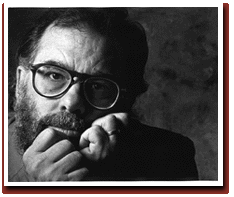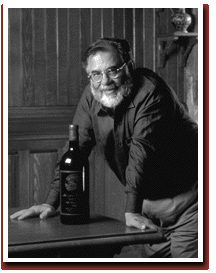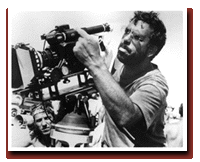


Francis Ford Coppola is one of America's most erratic, energetic and controversial filmmakers. Known primarily for his successful "Godfather" trilogy—THE GODFATHER (1972), THE GODFATHER, PART II (1974) and THE GODFATHER, PART III (1990)—Coppola has had a life and career of both stunning triumphs and tragic setbacks.
He has won five Academy Awards, received ten Oscar nominations and is winner of two Cannes Film Festival Palme d'Or Awards. But throughout the 1980s, Coppola's financial setbacks (including out of control budgets, costly box-office flops and problems at his cherished Zoetrope Studios) were well-publicized. Personal tragedy hit in 1986 when his son Gio died in a boating accident.
Coppola's films, over which he usually enjoys total control, vary considerably in style, genre and content. With the exception of more personal works (the "Godfather" series and 1979's war-themed APOCALYPSE NOW), and films which reflect his fascination with technology (THE CONVERSATION, 1974 and ONE FROM THE HEART, 1982), Coppola's oeuvre suggests not so much an auteur's unique distinction as a gifted director's complete command of his craft.
A fiercely driven Hollywood outsider, Coppola was raised in suburban New York in a creative, supportive Italian-American family (Coppola's father Carmine is a composer/musician; his mother Italia had been an actress). He studied theater at Hofstra University, where he staged the school's first all-student production.
In 1960, Coppola entered UCLA film school, eventually earning a Masters Degree. Learning both in the classroom and in the field, Coppola's years at UCLA were highly productive: he worked in various capacities on several soft-core porn films as well as projects for low-budget king Roger Corman; he wrote the Samuel Goldwyn Award-winning script Pilma, Pilma (which was never filmed); and he directed his first feature, the Corman-produced DEMENTIA 13, while in Ireland in the summer of 1963.
Coppola's 1966 UCLA thesis project was YOU'RE A BIG BOY NOW, a goofy Richard Lesteresque comedy which was distributed theatrically by Warner Bros.
In 1968, Coppola received his first studio directorial assignment, the big-budget box office disappointment FINIAN'S RAINBOW. Shortly thereafter he wrote and directed THE RAIN PEOPLE (1969), a small, personal film starring Shirley Knight as a distressed housewife who takes to the road.
During the 1960s, Coppola wrote or collaborated on over a dozen screenplays including the adaptation of THIS PROPERTY IS CONDEMNED (1966). He co-wrote with Gore Vidal the screenplay for IS PARIS BURNING? (1966) and, at age 31, capped off a prolific decade with his first Oscar, for the screenplay of PATTON (1970) (co-written with Edmund North).
In 1972, Coppola struck box-office gold and assured himself a lengthy chapter in film history with the monumental THE GODFATHER (1972), which he directed for Paramount. The film, co-adapted with Mario Puzo from the latter's bestseller, became one of the highest-grossing films in movie history and brought Coppola another Oscar for best screenplay adaptation. The film also earned the Oscar for best picture and a best director nomination for Coppola.
Starring Marlon Brando as Mafia Don Vito Corleone, Al Pacino as the favored son who takes over Vito's empire, Diane Keaton as Michael's beleaguered WASP wife, Robert Duvall as his trusted consigliere and Coppola's sister, Talia Shire, as the Don's daughter, THE GODFATHER has become a classic of American cinema, spawning two sequels.
Following work on the screenplay for THE GREAT GATSBY (1974), Coppola returned to directing in 1974 with THE CONVERSATION, from his own script about a lonely surveillance expert (Gene Hackman) whose obsessive eavesdropping leads to tragedy. The film, which brought Coppola two Oscar nominations and won the Palme d'Or at Cannes, features the high- tech gadgetry (here highlighted in the superb sound track, designed by Walter Murch) which was to fascinate Coppola throughout his career.
That same year, Coppola directed and co-wrote with Puzo the hugely successful THE GODFATHER, PART II (1974), winner of six Oscars, including three for Coppola as producer, director and writer. This sequel, starring Robert De Niro, daringly intercuts the story of young Vito's rise to power (a prelude to the first film) with the parallel, contrasting story of his son Michael's ascendance 30 years later. (Both parts of THE GODFATHER were later recut in chronological sequence for a nine-part TV series.)
Coppola followed with the wildly over-budget, long-delayed and catastrophe-prone APOCALYPSE NOW (1979). Loosely based on Joseph Conrad's Heart of Darkness, the film tracks a CIA operative (Martin Sheen) who travels up a Cambodian river during the Vietnam War in search of Colonel Kurtz (Marlon Brando), a legendary figure who has established a bizarre empire deep in the jungle. Production of the film was so problematic that, Coppola said, "little by little we went crazy." After many months of difficult jungle shooting and strenuous editing, the long-awaited, $30 million production enjoyed an emotional premiere at the Cannes Film Festival, where it won the Palme d'Or. A year later, the film took two Oscars.
APOCALYPSE NOW was followed by 11 years of box-office disappointments, with Coppola's films often suffering as a result of the director's egocentric tendencies. The $26 million production of ONE FROM THE HEART (1982) was a major financial and critical disappointment, due largely to Coppola's preoccupation with costly high-tech gadgets and experimental computer and video techniques at the expense of basic storytelling values.
In 1983 Coppola invested his own money in two adaptations of teenage-themed novels by S.E. Hinton. THE OUTSIDERS and RUMBLE FISH were both criticized as over-stylized and lacking in strong narrative impact and both lost money. Nevertheless, they captured the writer's world, as Coppola had intended, and provided screen introductions for an astonishing number of young actors who would, within a few years, come to dominate the Hollywood scene. Their casts include Matt Dillon, Mickey Rourke, Nicolas Cage, C. Thomas Howell, Ralph Macchio, Patrick Swayze, Rob Lowe, Emilio Estevez, Tom Cruise and Christopher Penn, as well as Diane Lane, Tom Waits and Dennis Hopper.
Showing considerable tenacity, Coppola next turned to THE COTTON CLUB (1984), an ambitious musical set in the famous Harlem jazz club of the 1920s. He put the script through nearly 40 drafts before the trouble-plagued production began. During the filming of the $48 million extravaganza, Coppola reportedly spent most of his time in his customized high-tech trailer, the "Silverfish," a state of the art audio/video fortress bristling with cameras, monitors, decks and computers.
Following the financial failure of THE COTTON CLUB, Coppola became a director-for-hire on the light time-travel comedy, PEGGY SUE GOT MARRIED (1986). With the facility, audacity and vision which have marked all his best films, he produced a haunting elegy for times past which had great appeal for Peggy Sue's contemporaries in the audience, then in their forties. He captured the look and feel, the colors and emotions of high school in the 1950s as no one else had. Rather quickly, PEGGY SUE GOT MARRIED became something of a perennial on videotape and TV, a proper companion piece to colleague and protégé George Lucas's AMERICAN GRAFFITI (1973), which deals with a slightly later period in our collective past. The film solidified Kathleen Turner's reputation and made a star of Coppola's nephew, Nicolas Cage.
Coppola's 1987 GARDENS OF STONE, a well-acted Vietnam War-era drama played out on the homefront, pleased some critics but not audiences. The far more impressive TUCKER: THE MAN AND HIS DREAM (1988) starred Jeff Bridges in the role of the real-life 1940s auto industry visionary. Coppola had been planning to make this film since the early 70s, when he had become fascinated with the story of Tucker, the brash but intelligent entrepreneur who dared to challenge the Detroit establishment. The story is not without parallels to Coppola's own career in Hollywood but, more importantly, TUCKER focuses attention on entrepreneurship and innovation at a time in American history when those qualities are sorely lacking. Like PEGGY SUE GOT MARRIED, TUCKER also reveals a striking sense of period. Because Coppola uses the cinematic conventions of the 1940s to capture the look and feel of the time, TUCKER is as much about his (and our) memory of the period as it is about the period itself. If you weren't alive during that time, this is as close as you'll get. In 1989, Coppola directed the Life Without Zoe segment (co-written by his daughter Sofia) of NEW YORK STORIES and received the weakest reviews of the three participating directors (Martin Scorsese and Woody Allen were the others).
Throughout his career, shaky business ventures have magnified the problems of Coppola's box-office flops. In the 1960s, he poured profits from screenwriting into an ill-faited venture called Scopitone, a device which showed short movies on a jukebox; the world was not yet ready for music videos. In the 70s, the San Francisco-based City Magazine failed soon after he took it over. American Zoetrope went through several incarnations, first in San Francisco, where Coppola had settled early on, then in Los Angeles after he bought the Goldwyn Studios with visions of creating a studio controlled by artists. Reeling from the failure of ONE FROM THE HEART, he was pushed to the brink of bankruptcy as his debts vaulted to a staggering $30 million. In January 1990, just as Coppola began shooting THE GODFATHER, PART III (1990), Zoetrope Studios finally filed for Chapter 11 bankruptcy.
Coppola was working in Rome when the opportunity arose to direct THE GODFATHER, PART III (1990). On the verge of financial ruin and in need of a hit—just as he had been in 1971 when the first GODFATHER project was handed to him—Coppola acceded to Paramount chairman Frank Mancuso's pleas for a third installment. Bargaining for full artistic control over the project, he began what was to become a $55 million dollar, rumor-bound production in November 1989. THE GODFATHER, PART III (1990) reunited screenwriters Coppola and Puzo and stars Al Pacino, Diane Keaton and sister Talia Shire, this time joined by his daughter Sofia. Whatever Coppola does in the future, the "Godfather" series will remain the monument of his career. The first two installments alone earned more than $800 million at the international box office. Audiences may have come for the mafia gangster drama but they stayed for the family saga. The conflict that gives the trilogy its demonstrated mythic power is not the gangster film tension of good guys versus bad guys (where are the good guys?). It's the all-too-familiar tension between professional and personal commitments—gangster or filmmaker, you're still torn between home and office.
It is a conflict, to be sure, close to Coppola's heart. Practicing in real life the pervasive "Godfather" theme of the sanctity of the family, Coppola has consistently made members of his own family, including father Carmine, sister Talia Shire, nephew Nicolas Cage and daughter Sofia, key contributors to his films. He's not unique in this—John Cassavetes, Martin Scorsese and Paul Mazursky have done the same. Sofia's co-starring role in THE GODFATHER, PART III (1990), however, was widely cited as the most serious of the film's flaws.
Coppola was able to combine box-office success with his penchant for elaborate in-studio production with BRAM STOKER'S DRACULA (1992), a lavish, popular adaptation of the classic horror novel. The film's success led to Coppola's role as co-producer of MARY SHELLEY'S FRANKENSTEIN (1994), directed by Kenneth Branagh.
Besides his family, Coppola has been a kind of "godfather" to other directors, executive-producing for the likes of Paul Schrader, Wim Wenders and Akira Kurosawa and playing an important part in the restoration of Abel Gance's classic silent film, NAPOLEON (1927). Coppola has also indulged his love of technology in a version of the Rip Van Winkle story for cable TV and in the high-tech Michael Jackson fantasy short, CAPTAIN EO (1986).
The Godfather, Part II (Letterboxed Version)
Also available in a theatrical, widescreen format.
The Godfather, Part III (1990)
The stunning third installment in Francis Ford Coppola's crime saga finds a weary Don Michael
Corleone (Al Pacino) attempting to go straight for his family's sake and to finalize a complex
business deal with the Vatican. However, as Pacino tries to get out, "they pull [him] back in,"
with tragic consequences. Diane Keaton, Andy Garcia, Talia Shire, Sofia Coppola co-star. Video
version contains scenes not shown in theatres; 170 min.
The Godfather, Part III (Letterboxed Version)
Also available in a theatrical, widescreen format.
The Godfather Collection
Here's an offer that...we think will be to your liking: all three remastered "Godfather" movies in a
money-saving boxed set.
The Godfather Collection (Letterboxed Version)
Also available in a theatrical, widescreen format.
The Godfather 25th Anniversary Edition Boxed Set
The letterboxed versions of the three "Godfather" films are also featured in this collector's set
that comes with the book "The Godfather Legacy."
The Conversation (1974)
Riveting account of a surveillance expert who becomes entangled
in a dangerous murder case. Superb performances by Gene Hackman, John
Cazale, Allen Garfield, Harrison Ford. Directed by Francis Ford Coppola.
113 min.
Apocalypse Now (1979)
Francis Ford Coppola's masterful Vietnam War-updating of
Joseph Conrad's "Heart of Darkness" follows Army officer
Martin Sheen on a harrowing mission to "terminate" renegade
colonel Marlon Brando in his jungle fortress. Unforgettable battle
sequences and sterling supporting performances from Robert Duvall,
Frederic Forrest and Dennis Hopper mark this Academy Award-winning
war drama. 153 min.
Rumble Fish (1983)
Matt Dillon is a troubled youth whose life changes when his legendary
punk brother returns home. A unique look at teenage alienation, taken
from S.E. Hinton's popular novel, directed by Francis Coppola.
Mickey Rourke, Dennis Hopper, Tom Waits. Strikingly filmed in black
and white. 94 min.
The Outsiders (1983)
Beautiful and exciting adaptation of S.E. Hinton's classic tale
of gangs and growing up in Oklahoma. Matt Dillon, Tom Cruise, Rob
Lowe, Diane Lane, Patrick Swayze, Ralph Macchio, C. Thomas Howell
and Emilio Estevez head the dynamic cast of rising stars; with Leif
Garrett, Sofia Coppola. Francis Coppola directs. 91 min.
Bram Stoker's Dracula (1992)
Francis Ford Coppola's lush retelling of "the strangest
passion the world has ever known" stars Gary Oldman as the undying
Count searching for his long-lost love, Winona Ryder as a young woman
who falls under Dracula's spell, and Anthony Hopkins as vampire-hunting
Van Helsing. Lavish sets and special effects propel this genuinely
haunting horror film; with Keanu Reeves, Sadie Frost. 128 min.
BELA LUGOSI
§
BORIS KARLOFF
§
BRAM STOKER
§
FRANKENSTEIN
§
LON CHANEY
§
WES CRAVEN
§
MARY SHELLY
§
VINCENT PRICE